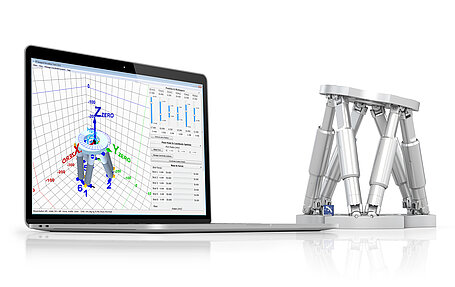- Products - Physik Instrumente (PI) GmbH & Co. KG
Choosing the Right Hexapod Model: Software from PI Simulates Real Application Situation

Parallel-kinematic hexapods often are a good alternative to stacked single axis positioners when used in multi-axis positioning applications. They are more compact, achieve high dynamics on all axes, and they are available in many models for various loads and travel ranges.
Are the Workspace and Load Suitable?
Datasheet data only offers limited insight into which hexapod is suitable for a particular application. Although datasheets provide detailed information on, for example, the maximum travel ranges of the individual axes; the workspace limits of parallel kinematics, however, vary according to the current position (translational and rotational coordinates), the current coordinates of the rotational point (pivot point), and the chosen reference coordinate system. With the help of the simulation tool, these limits can be calculated for standard hexapods in Cartesian coordinates, graphically represented, and adjusted to the respective application. Mechanical problems, which can occur in the application, can, therefore, already be found and solved without having to own a hexapod or controller.
The same holds true for the load limit value of the hexapod that also varies depending on a number of factors. These factors being the orientation of the hexapod when mounted, the planned load, and especially the position of the center of mass, the respective position of the motion platform (translational and rotational coordinates) as well as the forces and the torques that work on the motion platform of the hexapod and on the individual struts. These influencing factors can also be simulated with the help of graphical elements such as sliders in order to find out which hexapod model is best suited for the application. With the help of this tool, finding an appropriate parallel-kinematic positioning solution becomes easy.
PI in Brief
PI (Physik Instrumente), headquartered in Karlsruhe, is the market and technology leader for high-precision positioning technology and piezo applications in the semiconductor industry, life sciences, photonics, and in industrial automation. In close cooperation with customers from all over the world and for 50 years now, PI's specialists (approx. 1,300) have been pushing, again and again, the boundaries of what is technically possible and developing customized solutions from scratch. More than 350 granted and pending patents underline the company's claim to its leadership. PI has six production sites and 15 sales and service offices in Europe, North America, and Asia.